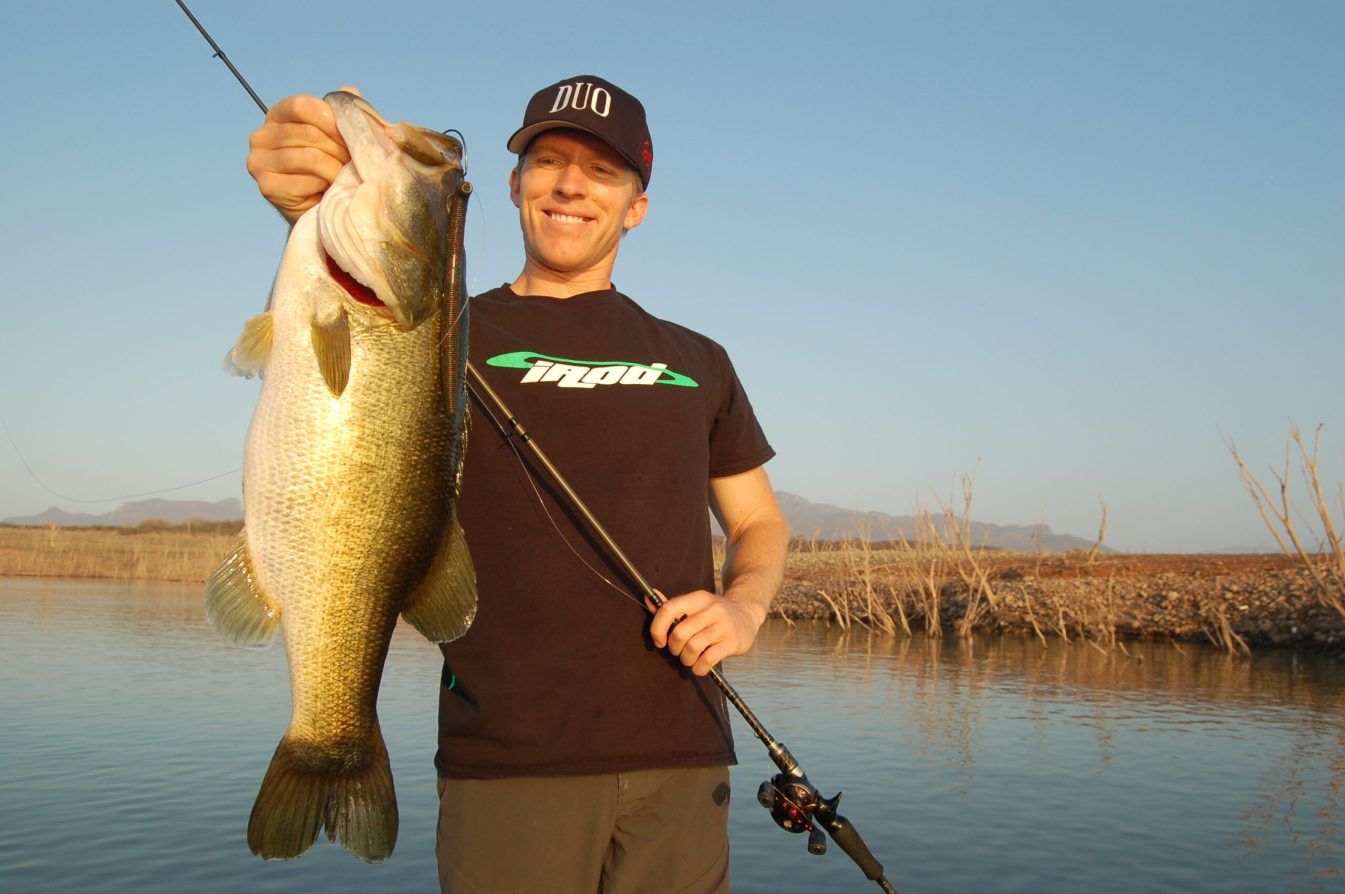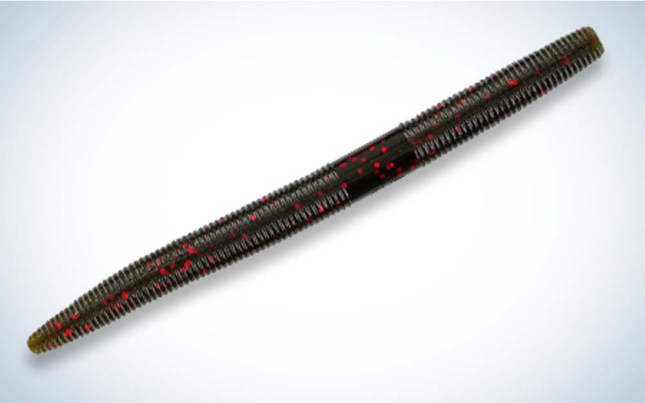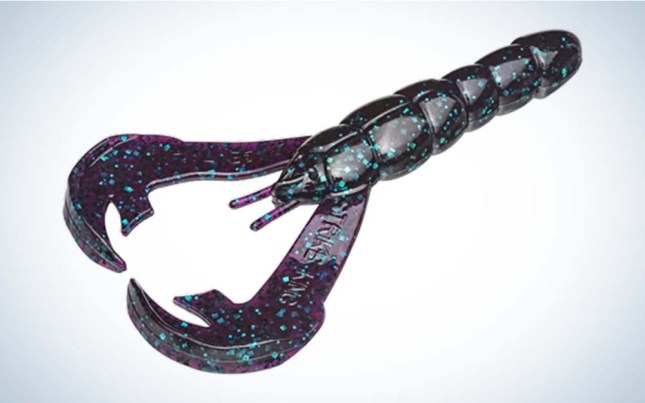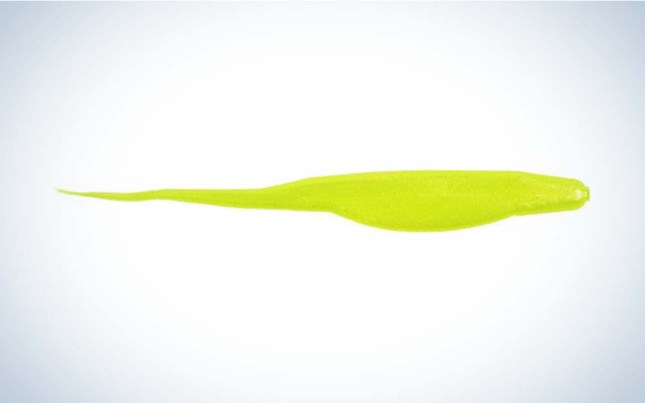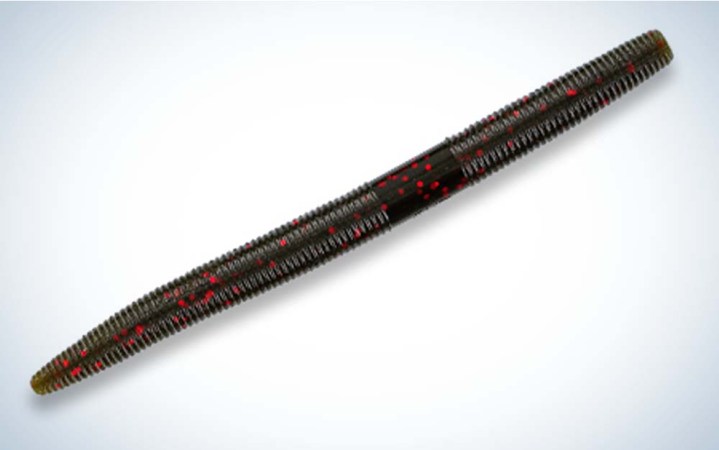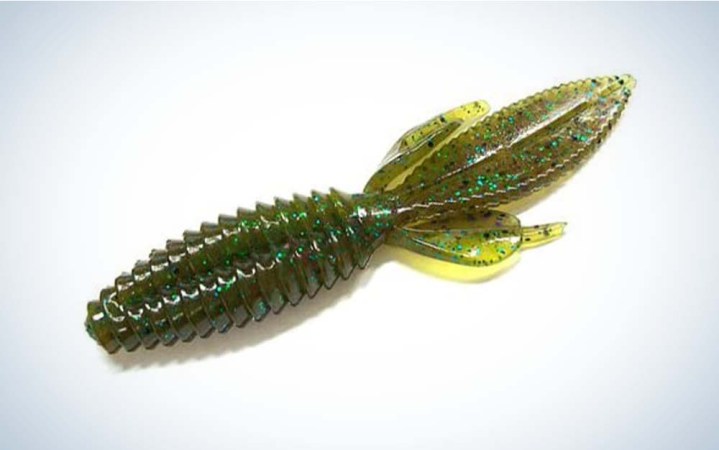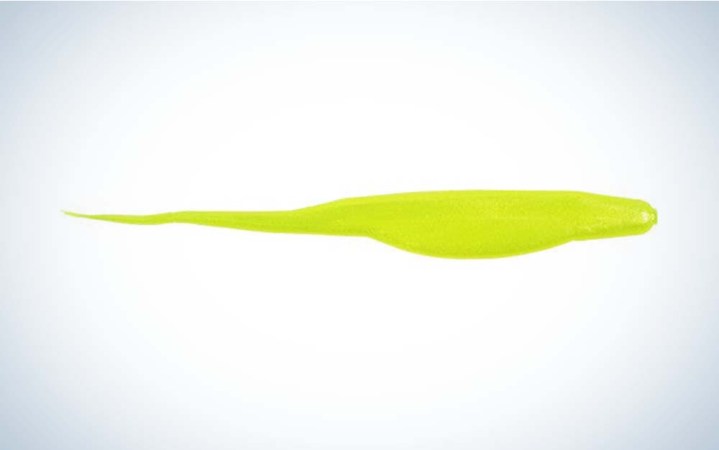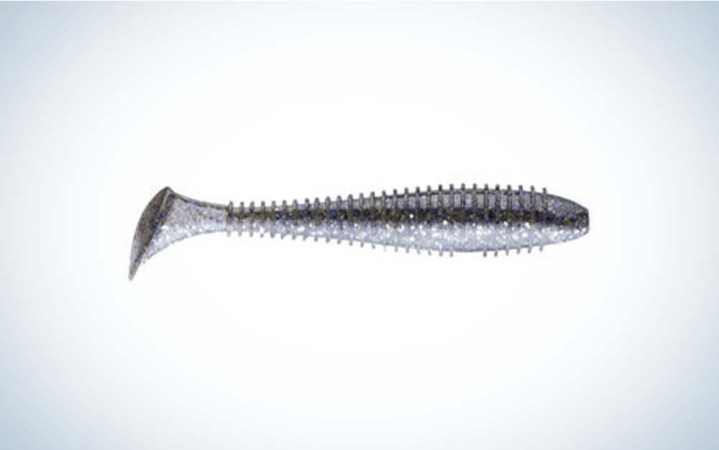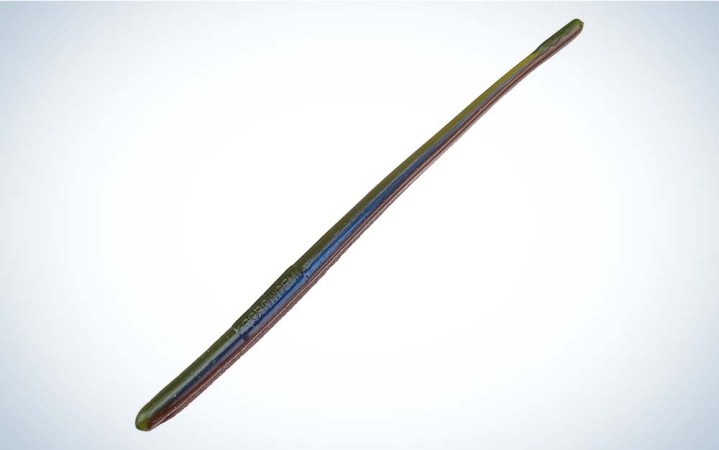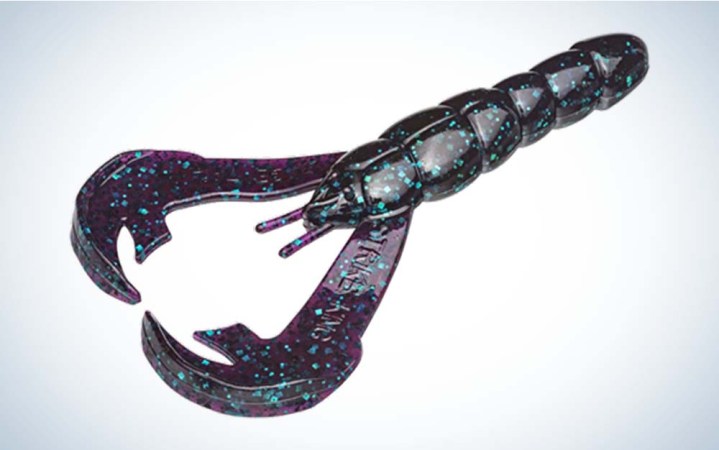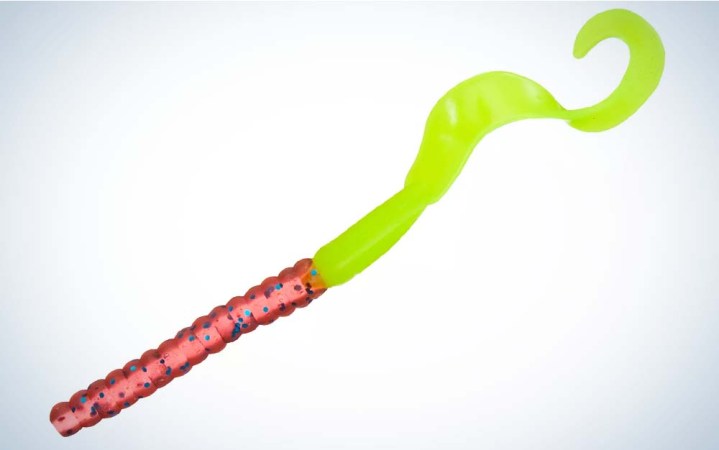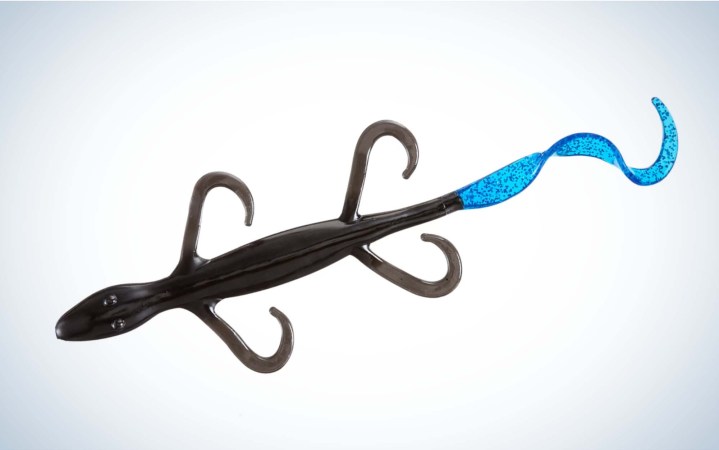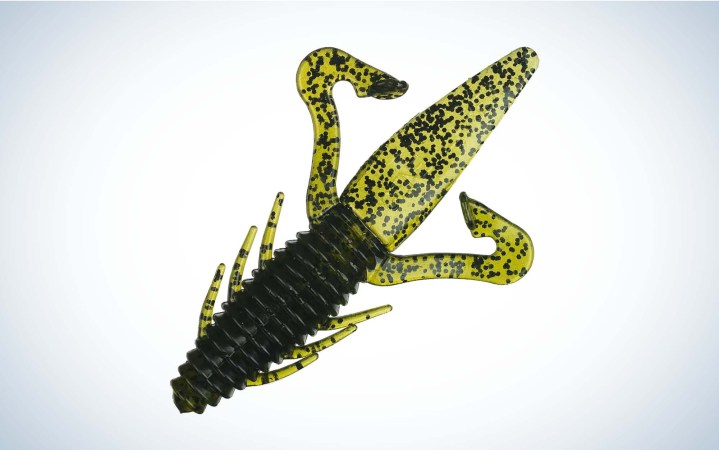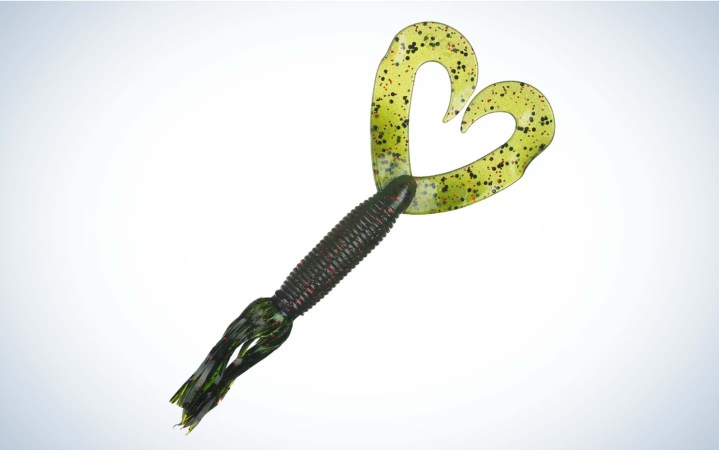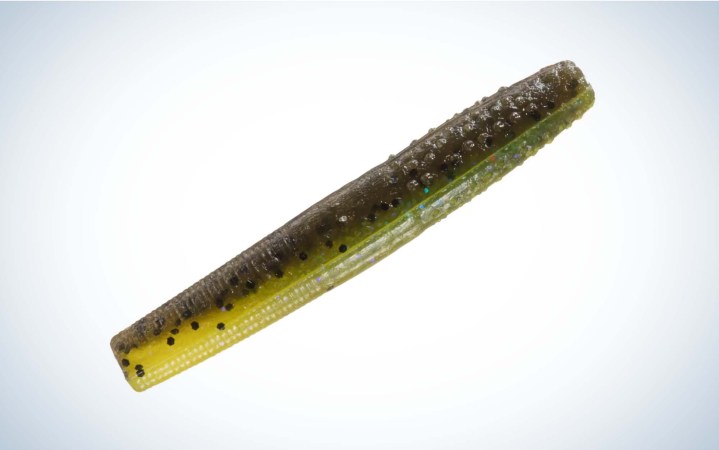We may earn revenue from the products available on this page and participate in affiliate programs. Learn More ›
Soft plastic lures are mainstays for catching bass 12 months out of the year, and the angler who doesn’t have a good selection of the best producers in proven colors—and an ample supply of the hot one on any given day—is going to miss out. Hard baits and spinnerbaits are critical tools, too, but they’re more situational than soft plastic baits, which excel in a wider range of scenarios. While there are times when you need a specific lure color to catch fish, I picked the best soft plastic baits for bass that are proven producers in most places and scenarios, regardless of color.
- Best Overall: Gary Yamamoto Custom Baits Senko
- Best for Flipping Heavy Cover: Reaction Innovations Sweet Beaver
- Best Jerkbait: Zoom Super Fluke
- Best Swimbait: Keitech Fat Swing Impact
- Best for Drop-shots: Roboworm Straight Tail Worms
- Best Craw: Strike King Rage Craw
- Best Classic Soft Plastic for Bass: Berkley PowerBait Power Worm
How We Picked the Best Soft Plastic Baits for Bass
Certain soft plastics serve multiple functions well, while others are masters of a specific application. It makes sense to integrate a number of each into your arsenal, choosing proven worldwide or regional color schemes to test their effectiveness. For this review, I looked for the best soft plastic baits for bass that will work for both novices and top tournament professionals. Some of these are versatile, some not, but in each case I wanted to make sure that the manufacturers’ products demonstrated quality and functionality.
Best Soft Plastic Baits for Bass: Reviews and Recommendations
Best Overall: Gary Yamamoto Custom Baits Senko
Key Features
- Size: 3, 4, 5, 6, and 7 inches
- Salt-infused
- Over 150 colors
Pros
- Versatile soft plastic
- Wide variety of sizes available
- Tantalizing fall
Cons
- Not durable
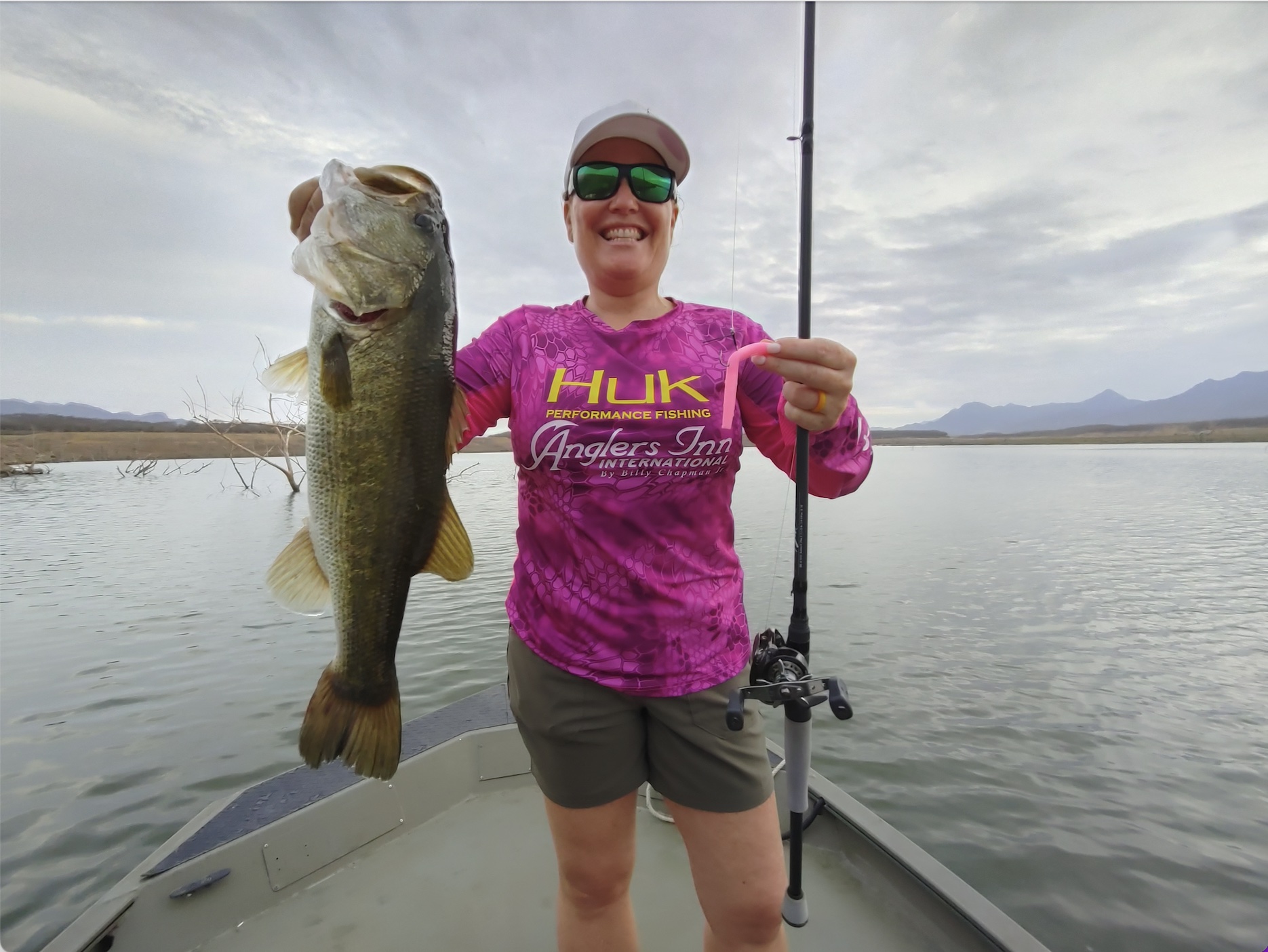
While many of the best soft plastic baits have all sorts of wiggly appendages and fancy tails, the simple Senko resembles a Bic Pen and still rules the roost. It’s at its best when wacky-rigged or fished Texas rigged shallow, but it can do so much more than that. Cut in half, it’s a perfect Ned rig bait. It also excels on the end of a Carolina rig or on a dropshot, and big bass are caught on massive jigs using the longest Senkos as trailers. This versatility makes it one of the best plastic worms. There are many imitations, but none match the original.
Best for Flipping Heavy Cover: Reaction Innovations Sweet Beaver
Key Features
- Sizes: Smallie, Sweet Beaver, and Double Wide—as well as variations like the Kinky Beaver and Spicy Beaver
- Split the tail or keep it whole for different fall rates and actions
- 60 colors available
Pros
- Compact, ribbed body offers weight without the bulk
- Great multi-color options
- Holds a large flipping hook in place
Cons
- Not a lot of action at rest
This ribbed, flat-bodied dynamo set the flipping world on fire when it emerged in 2002, and it remains a best-in-class choice for penetrating thick cover. You can customize the lure’s action by keeping the tail as one piece or splitting into two. With the tail left in one piece, it glides, making it a great bait for bedding fish. With the tail split, it provides just enough action on the fall to convince uncooperative bass that it’s time to feast. Behind a tungsten weight of any size, even two ounces, it looks natural and edible. Some of the color names are NSFW, but that’s part of the charm as well.
Best Soft Plastic Jerkbait: Zoom Super Fluke
Key Features
- Size: 4, 5 1/4, and 7 inches
- Slit belly for maximum hook-up percentage
- Must-have colors: Junebug, Watermelon Seed, Chartreuse Pearl
Pros
- Wide range of colors
- Can be made to dart, twitch or glide
- Soft plastic promotes better hooksets
Cons
- Not durable
The Super Fluke was one of the earliest members of its class and still excels, particularly when you let it fall weightless and then trigger it to dart erratically through the water column. It swims like an injured baitfish, and where legal, using two of them on the same rig can lead to a feeding frenzy. It’s also a fantastic Carolina rig bait, an excellent trailer for Scrounger heads and on vibrating jigs, and is available in smaller 4-inch and larger 7-inch sizes.
Best Swimbait: Keitech Fat Swing Impact
Key Features
- Size: 2.8, 3.8, 4.3, 4.8, 5.8, 6.8, and 7.8 inches
- Impregnated with squid scent
- Beefy paddle tail provides visual and sonic attraction
Pros
- Clamshell packaging keeps swimbaits in proper shape
- Tail moves at any speed
- Injection molding combines two different plastics for maximum balance
Cons
- Not all colors available in all sizes
The Fat Swing Impact spawned a generation of imitators, but none flaps as enticingly as the original, which works best burned, slow-rolled, or descended to the bottom on a semi-slack line. It works well on a weedless hook (weighted or unweighted) in shallow water and on jig heads, and it’s a prime choice for castable umbrella rigs. The Fat Swing is also an exceptional trailer on swim and vibrating jigs, and several companies have invented spinnerbaits specifically to hold these highly-effective lures. There’s also a “saltwater” formulation that provides enhanced durability, which works well in freshwater when fishing around toothy critters or using the Fat Swing Impact as a trailer.
Best for Drop Shotting: Roboworm Straight Tail Worms
Key Features
- Size: 4.5, 6, and 7 inches
- Salt release system
- Ultra-soft and natural
Pros
- Originator of several now-standard color patterns
- Super soft
- Can be nose-hooked or Texas rigged
Cons
- Not durable
This is the worm that the late, great finesse guru and three-time Bass Master Angler of the year, Aaron Martens made famous, especially with his signature colors like Aaron’s Magic and Martens Madness. It has the allure and attributes of a traditional California hand pour, but they’re actually poured robotically for maximum consistency. On a drop-shot it has a remarkable flutter that calls fish from a distance. The salt release system encourages even the wariest bass to hold on for the long haul. It also works remarkably well on a shakey head, and the larger sizes are great for Carolina rigging and split shotting in clear water.
Read Next: Best Drop Shot Baits
Best Soft Plastic Craw: Strike King Rage Craw
Key Features
- Size: 4 inches long
- Patented Rage claws flutter at any rate of fall
- Proven color palette
Pros
- Versatile, can be used as a jig trailer or swimming presentation
- Durable
- Variety of color options
Cons
- Minimal action at rest
There are plenty of great craws, but Strike King’s hard-thumping Rage version adds a little more realism than competitors. Whether you’re pitching it alone, flipping it into thick cover, dropping it on a bed, or using it as a trailer this soft plastic bait is tempting for bass. On the back of a swim jig it flaps hard, and on a football jig or flipping jig it takes a distinct “claws-up” defense posture to trigger strikes. The Rage Craw series comes in all of the proven colors for a wide range of fisheries and even various forms of watermelons and green pumpkins. It’s also available in a 3-inch “Baby” size and a 4.5-inch “Lobster” version. All of them can be shortened to provide the right amount of flutter and flash without as much bulk.
Best Classic Soft Plastic for Bass: Berkley PowerBait Power Worm
Key Features
- Sizes: 4, 7, 8.5, 10, and 12 inches
- Ribbontail design provides excellent action
- PowerBait material keeps fish holding on
- Colors: More than 30 different options
Pros
- Wide variety of colors and sizes
- Easy to rig and fish
Cons
- It’s so popular that bass in pressured waters have likely seen it before
The bait designers at Berkley have spent decades optimizing the plastic worm, and all that effort and testing has led to the super-popular and long-standing PowerWorm. This is a versatile soft plastic that excels when fished around cover. The most common way to fish it is on a Texas rig, but you can also throw it on a Carolina rig, or even put it on a shaky head jig. It’s an easy bait for beginner bass anglers to use because there’s really no way you can mess up its action. Swim it, drag it, or hop it—it’s all good. In the summertime, big-bass hunters will run the 10-inch, or even 12-inch versions in deep water. The PowerWorm comes in a whole variety of colors but you can’t go wrong with a few packs of watermelon and blue/black fleck for most bass waters.
Best for Carolina Rigs: Zoom Lizard
Key Features
- Available in 4-, 5-, 6- and 8-inch sizes
- Available in dozens of colors
- Curly legs and tail provide action
- Must-Have Colors: Green pumpkin, june bug, and black and blue
Pros
- Inexpensive and widely available
- Incredible color selection to match any forage or conditions
- Versatile—it can also be Texas Rigged, dropshotted, or fished on a shaky head
Cons
- Sometimes when less is more a simple straight tail can be more effective
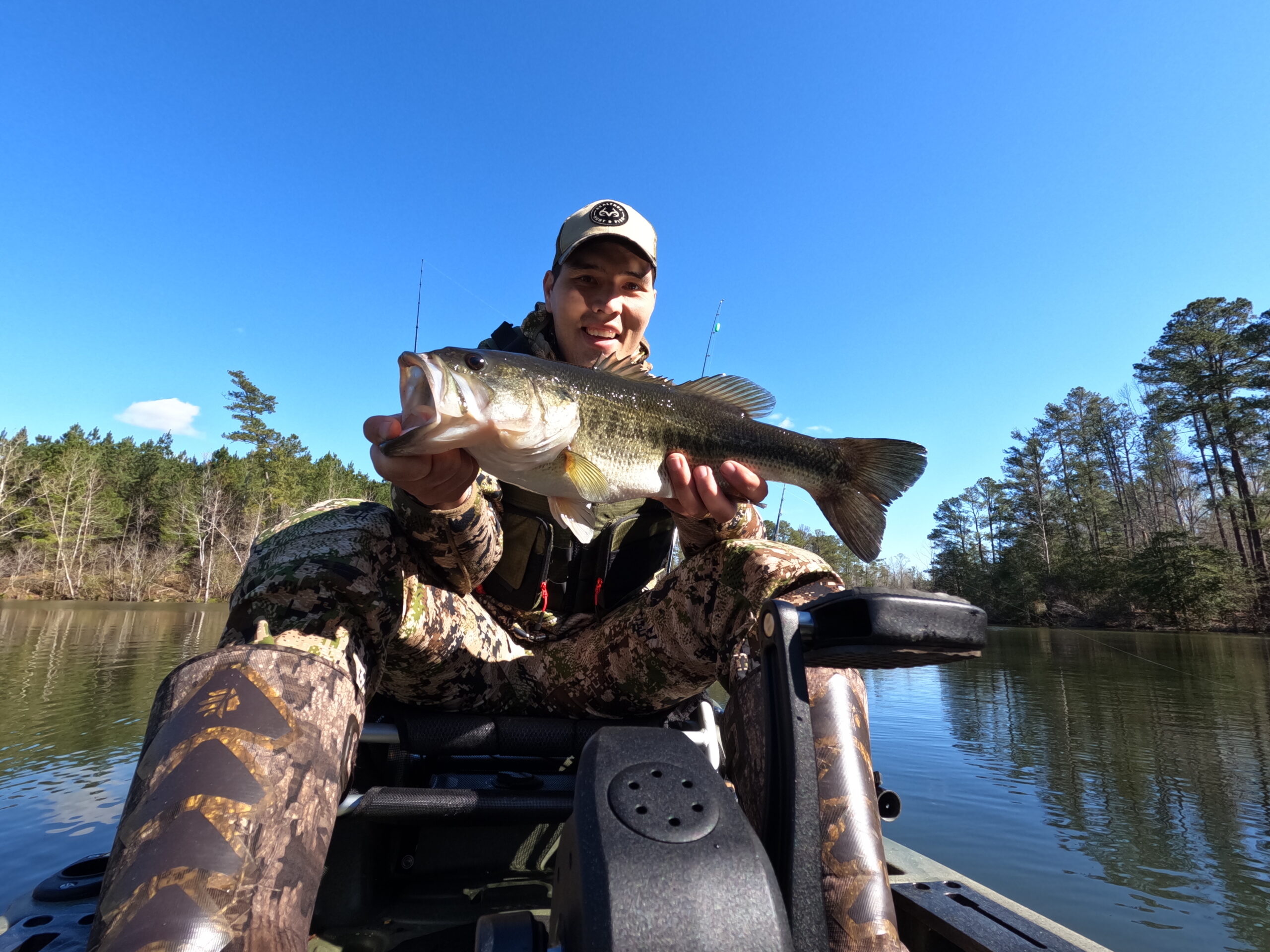
No lure has produced more bass behind the old “ball and chain” than the simple lizard, a versatile staple for decades that nevertheless often gets overlooked as newer options become available. It’s just finesse-oriented enough not to turn off reluctant biters but also provides enough action to draw fish from a distance and trigger them to bite. Whether you’re dragging it or hopping it in 18 inches of water or through cover that’s 40 feet deep, it can play 12 months out of the year for largemouths, smallmouths, and spotted bass alike. Zoom set the standard and continues to expand the color palette, but a good place to start is simple pumpkinseed, green pumpkin, or watermelon. They’re a great bargain because even when you’re not pulling the C-Rig, you can employ this same lure for pitching to laydowns, flipping grass, or a wealth of other productive presentations. When it gets hot this summer and it’s time to head offshore for Carolina rigging, thread one of the best soft plastic baits for bass onto your hook, the Zoom Lizard.
Best for Swinging Jigheads: Gene Larew Biffle Bug
Key Features
- 3.5-, 4.25- and 5-inch sizes
- Over 20 colors
- Solid tipped hollow body
Pros
- Solid tip holds hook in place without compromising tubelike action
- Oval cavity holds a rattle for extra attraction
- Can be modified by removing legs
Cons
- No big curly tail on the back for super-dirty water or when bass are ultra-aggressive
Veteran Oklahoma bass pro, Tommy Biffle, popularized the swinging jighead (aka, “wobble head”). While other creature baits and craws work fine, his original soft plastic creation remains the gold standard. It is compact yet bulky, with hard flapping legs to draw attention and a flat tail that enables it to glide. That differentiates it from the curly-tailed competition and allows it to dart and glide as the articulated jighead comes into contact with all manners of cover. There’s also a more aggressively-style flipping version available.
Best for Desert Lakes: Yamamoto Double Tail Hula Grub
Key Features
- 4- and 5-inch sizes
- Ultra-soft plastic
- Over 30 proven colors
- Imitates crawfish
Pros
- Loaded with salt
- Soft plastic helps fish hold on
- The action of a jig without being overpowering
Cons
- Soft plastic means anglers may need several bags to get through the day
Long before the Senko was a twinkle in his eye, the Hula Grub was the lure that made Gary Yamamoto famous. He popularized it around his Lake Powell (Arizona) campground on Lake Mead, where clear water, heavy rocks, and pressured fish often combined to make fishing tough. It quickly spread throughout similar venues around the west before becoming an eastern dynamo. It can be Texas Rigged or put on a ball head jig, but it does best in navigating the cracks and crevices of rocks of all sizes on a football head – you can go as light as 1/32 ounce in super-skinny water or over an ounce to maintain bottom contact deep. The curl tails and serrated skirt provide great action even at rest, with the slightest current or wave motion.
Best for Ned Rigs: Z-Man Finesse TRD
Key Features
- 1.75-, 2-, 4- and 6-inch sizes
- Durable ElaZtech plastic
- 30 colors
Pros
- Naturally buoyant
- Extreme durability makes them a bargain
- Innovative multiple-tone colors plus the standards
Cons
- Cannot be stored safely with other types of plastic
It’s hard to fully understand why one soft plastic should be better than another for Ned Rigging. After all, it’s a technique where featureless plastics and minimal action is the name of the game. Nevertheless, Z-Man has formulated a system for this technique – and the products involved in it – that make the most of less. That starts with floating plastic, so the lure is constantly visible, even in soft muck or silt, even when using the smallest size. Moreover, they’ve made it out of tear-resistant ElaZtech, so it won’t pull off the hook or rip easily, saving you time on the water and money in your tackle budget. The TRD is available in straight-tail nub designs and various other shapes, including Hogz, Minnowz, Ticklerz, and Tubes.
Tips for Catching More Bass on Soft Plastics
- With a bottle of Spike-It dipping dye (or the comparable aerosol can or markers) it’s possible to add a touch of color to factory patterns. Chartreuse is the most popular, but others like orange and blue can be useful, too.
- Even the best soft plastic bait for a specific situation won’t be effective if you don’t use enough hook. Make sure the wire is fine or powerful enough for your line, and that there’s enough gap to penetrate a balled-up lure.
- Anglers can get extra usage out of soft plastics by patching them up with Mend-It or regular Super Glue. Many wacky worm fans use O-Rings to keep their Senkos from tearing.
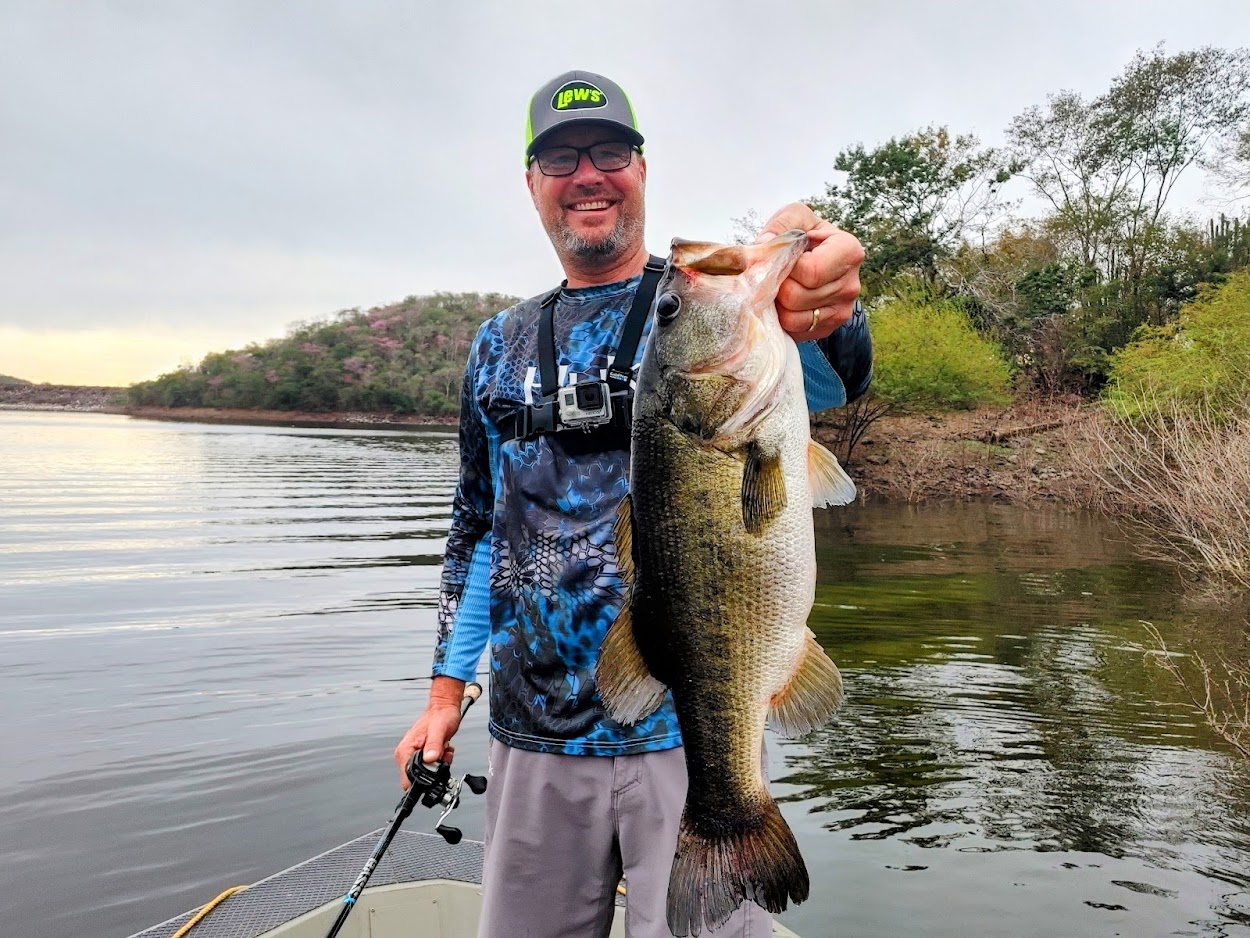
FAQs
The best color plastic worm for bass depends heavily on conditions, including water clarity and the available forage, but it pays to keep a basic selection on hand. That includes watermelon, green pumpkin, and black and blue. In tannic water or on tidal fisheries you should add in junebug, and consider baitfish colors on a drop-shot.
Many soft plastics can be fished weightless or without a sinker. These include the Senko, which is often at it’s best on a weight-free Texas rig or fished “wacky” style. Fluke-style lures also excel weightless. If you need to get deeper or contend with current, there are various nail weights and other inserts that get the job done without dampening a lure’s action.
Most soft plastics do not require a swivel. If your swivel creates line twist, take care to straighten it out or change your line at the end of the day. There are, however, some notable exceptions. One is the Super Fluke, which is often fished on an 8- to 12-inch leader with a swivel connecting the two lines. Not only does the swivel add casting weight and keep the lure down, but some anglers believe it represents an even smaller baitfish that the Fluke is chasing. Of course, a Carolina rig also employs a swivel to keep the weight away from the trailing soft plastic and to prevent line twist.
Why Trust Outdoor Life?
Since 1898, OL has been a leading authority in testing and reviewing hunting gear, fishing tackle, guns and shooting equipment, and much more. We have more than a century-long history of evaluating products, and we’re now bringing that expertise to online reviews. Our editors are experienced outdoorsmen and women, and most importantly, we’re trained journalists. We prioritize field testing and objective data when reviewing products. We conduct interviews with gear manufacturers and engineers as well as outdoor experts so that our readers have an understanding of how and why a product works—or doesn’t.
Advertising does not influence our gear reviews and it never will. While we always focus our coverage on standout products—because we want our readers to be aware of the latest and greatest gear—we also cover the flaws and quirks of any given product.
Read Next: Best Spring Bass Lures
Final Thoughts on the Best Soft Plastic Baits for Bass
There are endless soft plastic options on the market, and it’s easy for beginning anglers to go down an endless rabbit hole of experimentation. There’s nothing wrong with experimenting with new baits, but when it becomes a game of constantly changing lures, that takes away from valuable fishing time. Keep colors simple and find six or eight soft plastic designs that work for you. These are some of the best soft plastic baits for bass anywhere they swim. Fish long enough with these and you’ll see that slight size or color variations can make all of the difference.
- Best Overall: Gary Yamamoto Custom Baits Senko
- Best for Flipping Heavy Cover: Reaction Innovations Sweet Beaver
- Best Jerkbait: Zoom Super Fluke
- Best Swimbait: Keitech Fat Swing Impact
- Best for Drop-shots: Roboworm Straight Tail Worms
- Best Craw: Strike King Rage Craw
- Best Classic Soft Plastic for Bass: Berkley PowerBait Power Worm
